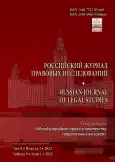Reforms and Reformers on the Question of the Causes, Features and Results of the State-Legal Transformation of Prussia at the Beginning of the 19th Century
- Authors: Baev V.G.1
-
Affiliations:
- Law Institute of Tambov State, Technical University
- Issue: Vol 9, No 1 (2022)
- Pages: 33-42
- Section: Theory and history of state and law
- URL: https://journal-vniispk.ru/2410-7522/article/view/100330
- DOI: https://doi.org/10.17816/RJLS100330
- ID: 100330
Cite item
Abstract
This study aims to analyze and provide a historical and legal assessment of administrative, economic, and social transformations in Prussia in the first half of the 19th century to study the circumstances and conditions of the formation of a new political, legal, and economic reality of the country. Moreover, the role of specific personalities who made a mark in history during this period is explored to obtain an idea of what administrative, legal, and economic patterns they reshaped in the management system. The author focuses not on the transformations but on the personalities whose hands have produced those transformations (an objective series of events) in Prussian Germany. Reformers-researchers (first, Stein, Gardenberg, V. Humboldt) realized their own private interest, but the totality of personal interests was already of public interest, and they themselves acted as its subjects. The success of the reformation was also determined by the prevailing atmosphere in the country, which was filled with great philosophers, historians, and writers with their ideas and deeds. The author concludes that science in Germany was more than science. She actively participated in the process of transformation in the country.
The author proves that the Prussian reformation, despite the different ideas of the participants about its goals, objectively contributed to the creation of the foundations of the bourgeois state on the basis of the monarchical form of government. As a legacy of the reformation stage, the Prussian statehood created in the second half of the 19th century was passed into the hands of Otto von Bismarck. Thus, it was not Bismarck who paved the way for Hitler. The reformers handed him a state building — almost built according to their schemes — which even the “iron” chancellor could not rebuild. In addition, we must consider that the modernization of Prussia developed in opposition to the counter-reformation, its legal expression was the so-called Carlsbad resolutions, which decelerated the dynamics of reforms.
Full Text
##article.viewOnOriginalSite##About the authors
Valery G. Baev
Law Institute of Tambov State, Technical University
Author for correspondence.
Email: vgbaev@gmail.com
ORCID iD: 0000-0002-5837-4991
doctor of law, candidate of historical sciences, professor
Russian Federation, TambovReferences
- Bismarck Otto von. Die gesammelten Werke. Bd. XIV. Berlin, 1923–1933. 637 S.
- Baev VG, Meshcheryakova SV. Process stanovleniya politicheskoj lichnosti: opyt germanskogo kanclera Otto fon Bismarka. Voprosy istorii. 2021;(11):166–177. (In Russ.).
- Pflanze Otto. Bismarck. Der Reichsgründer. Band 1. München, 1997. 906 S.
- Engel's F. Lyudvig Fejerbah i konec klassicheskoj nemeckoj filosofii / K. Marks, F. Engel's. Poln. sobr. soch. T. 21. Moscow: Politizdat; 1961. P. 1–51. (In Russ.).
- Engel's F. Anti-Dyuring / K. Marks, F. Engel's. Poln. sobr. soch. T. 20. Moscow: Politizdat; 1961. P. 1–480. (In Russ.).
- Engel's F. Pis'mo Jozefu Blohu, 21 [-22] sentyabrya 1890 / K. Marks, F. Engel's. Poln. sobr. soch. T. 37. Moscow: Politizdat; 1965. P. 396–397. (In Russ.).
- Schubert Werner. Französisches Recht in Deutschland zu Beginn des 19. Jahrhunderts. Zivilrecht, Gerichtsverfassungsrecht und Zivilprozeßrecht. Köln – Wien, 1977. 642 S.
- Gesetz-Sammlung fur die Königlichen Preussischen Staaten (1815). Eine Ausführungsinstruktion vom 3. VII. 1815. 1032 S.
- Stein Karl (Freiherr vom und zum). Hrsg. v. Kurt von Raumer. Aschendorff, 1955. 53 S.
- Meinecke Friedrich. Von Stein zu Bismarck. Historische Aufsätze. Berlin: Verlag der deutschen Bücherei, 1956. 104 S.
- Korkunov NM. Lekcii po obshchej teorii prava. Saint-Petersburg, 1907. 354 p. (In Russ.).
- Syryh VM. Materialisticheskaya filosofiya publichnogo prava. Moscow: Yurlitinform, 2016. 571 p. (In Russ.).
- Frolov AS. Tamozhennyj soyuz. 1818–1848 gg. Avtoref. dis. … kand. ist. nauk. Saint-Petersburg, 2008. 21 p. (In Russ.).
- Popov GG. Fridrih List i nacional'naya ekonomicheskaya bezopasnost': istoriya i sovremennost'. Istoriko-ekonomicheskie issledovaniya. 2007;8(1):30–50. (In Russ.).
- Treitschke H.v. Deutsche Geschichte im I9. Jahrhundert. 5 B-de. Lepzig, 1918–1920. 790 S.
- Weber W. Der Deutsche Zollverein. Geschichte seiner Entstehung und Entwicklung. Leipzig, 1871 (ND: Glashutten, 1972). 503 S.
- Vorgeschichte und Begründung des Deutschen Zollvereins 1815–1834. Akten der Staaten des Deutschen Bundes und der europaischen Mächte. Bd. 1–3. Berlin, 1934.
- Gesetz-Sammlung der königlichen preussischen Staaten. 1833. Berlin: zu haben im vereinigten Gesetz-Sammlungs-Debits-und Zeitugs-Komtoir, 1833. 679 S.
- Huber E.R. Deutsche Verfassungsgeschichte seit 1789 / Bände 1–7. Bd. 1. Stuttgart, 1957–1960. 737 S.
- Handbuch der preussischen Geschichte. Band II. Das 19. Jahrhundert und grosse Themen der preussischen Ges-chichte. Hrsg. O. Büsch. Berlin: Walter de Gruyter, 1992. 428 S.
- Makar'ev IV. Vil'gel'm Gumbol'dt ob istorii i istoricheskom myshlenii. Problemy sovremennogo obrazovaniya. 2020;(4):9–19. (In Russ.).
Supplementary files







